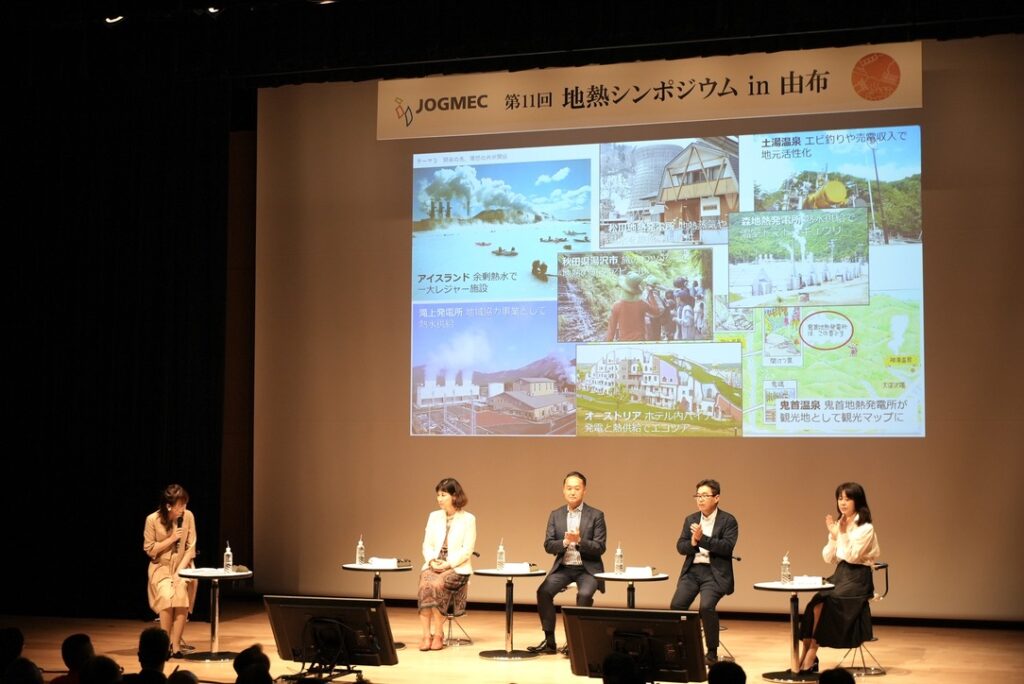
Japan Organization for Metals and Energy Security (JOGMEC) held the 11th Geothermal Symposium in Yufu on 4 September in Yufu City, Oita.
Although Japan ranks third in the world in terms of geothermal resources, boasting 23.4 million kilowatts, following the US and Indonesia, it has only harnessed 600,000 kilowatts, placing it at the tenth position. In addition to development costs, drilling risks, and deregulation, one of the primary reasons for the sluggish development of geothermal energy is the challenge of gaining the understanding of local people living in hot spring areas. On the other hand, Japan is committed to doubling its share of renewable energy from the current 22% to 46% by 2030, with the goal of achieving carbon neutrality by 2050. Based on this, there is a target set to increase the installed geothermal power capacity to 1 million kilowatts.
With this background, raising awareness of geothermal energy is no doubt one of the key solutions to the challenges. It's crucial to both alleviate the concerns of spa operators and elevate public awareness of geothermal energy. In pursuit of this objective, JOGMEC hosts an annual Geothermal Symposium in regions where geothermal energy is being developed, coinciding with Geothermal Day on the 8th of October.
This year's event was held in Yufu City, Oita, where geothermal development is widespread. The event brought together stakeholders involved in geothermal development, including the Ministry of Economy, Trade and Industry, local governments, the non-partisan Diet Members' Caucus for the Promotion of Geothermal Power Generation, electric power companies, geothermal developers, people involved in hot springs and multiple geothermal use. Since it is important to first learn about geothermal energy to raise awareness, the history of geothermal power generation in Oita, examples of the use of electricity generated by geothermal energy, and examples of initiatives aimed at co-creation and co-prosperity between geothermal energy and hot springs were presented.
Kyushu is located where the oceanic plate subducts into the continental plate. Due to the magma created by plate activity, volcanic mountains form a line known as the Volcanic Front, which runs from north to south of Kyushu. As a result, Kyushu is rich in geothermal heat. Oita Prefecture, located on the Volcanic Front, calls itself "Japan's Best Hot Spring Prefecture" and boasts the highest number of hot spring sources in the country, with 18% of the total number of hot springs and 12% of the total amount of hot spring water gushing out of the prefecture. Oita also has the highest proportion of geothermal power generation in Japan at 32% (175 megawatts).
Oita has a very long history of geothermal power generation: the world's first geothermal power plant was built in Italy in the 1900s, and Japan's first geothermal power plant was built in Beppu City in 1925. This was followed in the 1950s by the development of a separate heat and water plant in New Zealand, and in 1967 the Otake Geothermal Power Plant opened as Japan's first geothermal power plant with separate heat and water. In the 1970s, the Hachobaru Geothermal Power Plant, the largest of its kind in Japan, began operation.
As an example of how geothermal energy can be used, Oita is currently conducting a demonstration project to produce green hydrogen from geothermal energy. The heat used to generate electricity is also used in agriculture and forestry, for example in the production of bell peppers and kikurage mushrooms.
The panel discussion highlighted the importance of building a relationship of trust between hot spring operators and geothermal developers to co-create and co-prosper from geothermal energy with the local community. The panel stressed the importance of building trust between hot spring operators and geothermal developers for the co-creation and co-prosperity of geothermal energy in the local area, and that it is important to ensure the safety of the local community through monitoring by geothermal developers, and for local residents themselves to manage geothermal development for the revitalization of the local community. As representative examples, the Waita Geothermal Power Plant in Oguni, Kumamoto in which Baseload Power Japan participates, and the Tsuchiyu Onsen Binary Power Plant in Tsuchiyu, Fukushima, was presented as a typical example. The hot springs are our asset," said Izumi Kuwano, president of the Yufu City Tourism Bureau. Through co-creation and co-prosperity, we can drive the energy transition to build a sustainable society and create jobs at the same time.
The public and private sectors also need to be encouraged to promote and popularize geothermal energy, and JOGMEC is working to reduce risk by providing financial support, such as grants for exploration and drilling. Hitoshi Mayama, author of the novel Magma, which tells a story of the development of geothermal energy, said it was also necessary to gain public support through social media. Shin Takebe, a member of the House of Representatives from the non-partisan Diet Members Caucus for the Promotion of Geothermal Power, which is working on legislation and deregulation related to geothermal power, attended the symposium and agreed that the public and private sectors must work together to "seriously tackle this issue”. We at Baseload Power Japan will also contribute to the dissemination and promotion of geothermal energy in Japan.
Photo: JOGMEC.